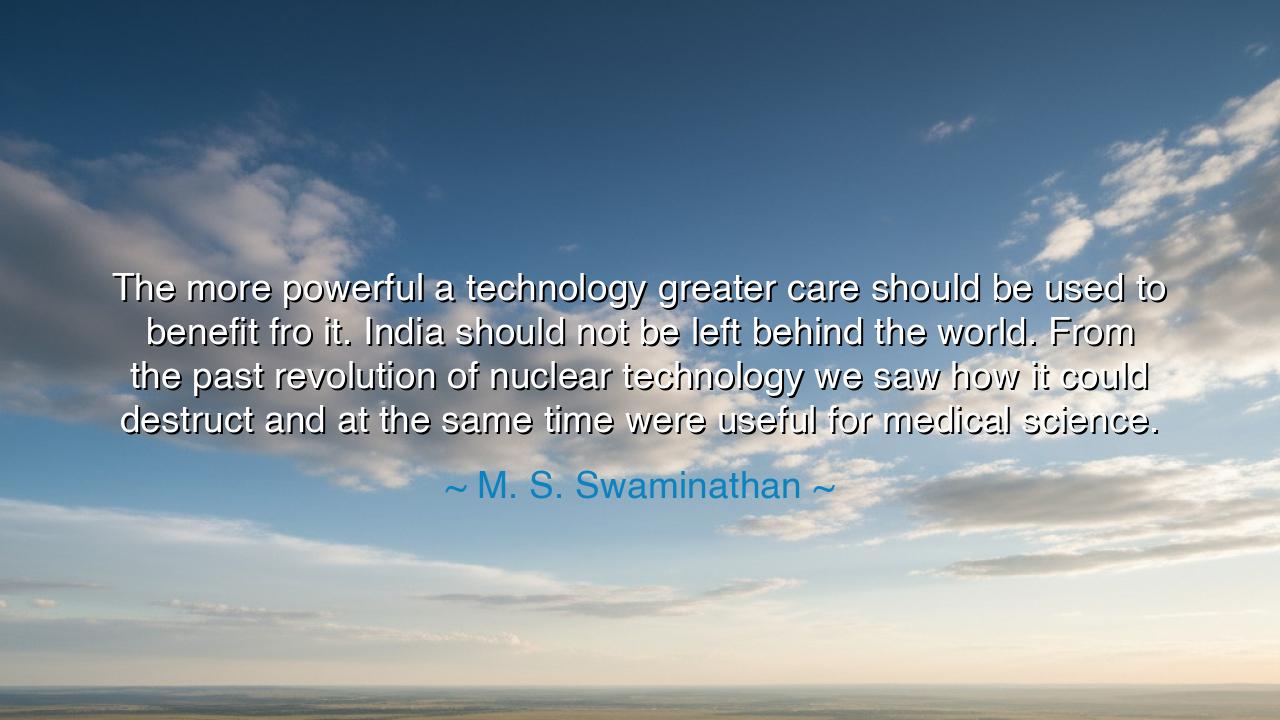
The more powerful a technology greater care should be used to
The more powerful a technology greater care should be used to benefit fro it. India should not be left behind the world. From the past revolution of nuclear technology we saw how it could destruct and at the same time were useful for medical science.






Hear the voice of M. S. Swaminathan, father of India’s Green Revolution, who spoke with foresight and solemnity: “The more powerful a technology, greater care should be used to benefit from it. India should not be left behind the world. From the past revolution of nuclear technology we saw how it could destruct and at the same time be useful for medical science.” In these words lies a truth both ancient and modern—the truth that every tool forged by man carries within it two faces: one that heals and one that harms, one that builds and one that destroys.
At the heart of his saying is the call for care. For when a technology is small, its misuse brings little ruin; but when it is mighty—capable of shaking mountains and burning cities—then even the slightest negligence can bring catastrophe. Swaminathan points to the double-edged nature of nuclear technology: from the ashes of Hiroshima and Nagasaki rose the reminder of its destructive power, yet in hospitals and laboratories, the same force is harnessed to fight cancer, to diagnose illness, to preserve life. This paradox reminds us that the worth of a tool is not in its nature but in the hands that wield it.
He warns also that India must not lag behind the march of progress. In an age where nations rise or fall upon their mastery of technology, to stand idle is to invite subjugation. Just as the Industrial Revolution transformed Europe, and the nuclear age reshaped global power, so too must the emerging world seize the tools of science to uplift its people. Swaminathan’s own life was proof of this vision: through agricultural science he brought food security to millions, showing that when knowledge is wedded to wisdom, nations may flourish.
History gives us both caution and inspiration. Consider the Manhattan Project, which unlocked the power of the atom. In the hands of warriors, it unleashed devastation unseen before, changing the destiny of nations in a single flash of light. Yet in the years that followed, scientists turned that same technology to peaceful ends—harnessing isotopes to treat disease, to generate energy, to deepen understanding of life itself. This is the double legacy Swaminathan recalls: destruction and creation, both born from the same flame.
The ancients too knew this principle. Fire, once tamed, gave warmth and cooked food, but in reckless hands it razed villages. Iron forged into plows fed multitudes, but shaped into swords it ended lives. So it has ever been: the more powerful the gift, the greater the burden of wisdom. And so it shall always be: each generation must decide whether its tools serve life or death, harmony or ruin.
The lesson, O seekers, is clear: embrace technology, but temper it with humility. Do not reject power, for power is the servant of progress, but do not worship it, for worship breeds blindness. Ask always: will this invention uplift humanity, or will it enslave? Will it heal the earth, or will it scar it? In the answer to these questions lies the destiny of nations.
Practical counsel is this: educate yourselves in the sciences, but anchor yourselves in ethics. Let each discovery be tested not only in laboratories, but also against the compass of conscience. Demand that leaders, engineers, and citizens alike weigh consequences before rushing forward. And for India, and for all lands, let there be courage not to fall behind, yet wisdom not to advance blindly.
So let Swaminathan’s words echo across the ages: “The more powerful a technology, greater care should be used to benefit from it.” In this saying lies both warning and promise. If mankind wields its tools with care, it shall rise to new heights of knowledge and well-being. But if it forgets caution, it shall stumble into ruin. Choose then the path of balance, where progress serves life, and where power bows before wisdom.






AAdministratorAdministrator
Welcome, honored guests. Please leave a comment, we will respond soon